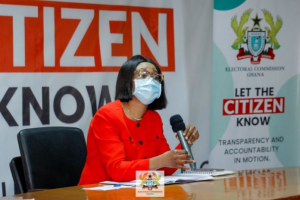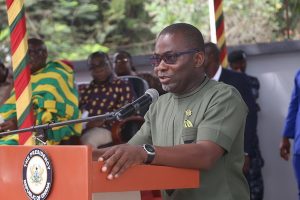Madam Sarah Adwoa Safo, Minister for Gender, Children and Social Protection, says data from the Ghana Health Service (GHS) District Health Information Management System (DHIMS) reveals that the country recorded about 110,000 cases of teenage pregnancies in the year 2020.
She said out of the total, 107,023 girls were between 15 and 19 years while 2,856 were between 10 and 14 years.
The Minister said this in a speech read on her behalf at the bi-annual tracking meeting on the implementation of the Adolescent Pregnancy Strategy on Wednesday.
Madam Safo said adolescents and young people were entitled to decent livelihoods, adding, “Girls face disproportionate risks and distinctive consequences related to the vulnerabilities they experience.”
She said girls were disproportionately vulnerable to the violation of their human rights, inadequate reproductive health services, education and subjected to child marriage, limiting the realisation of their full human potential.
Madam Safo said in this part of the world, young girls, compared to their male counterparts, were more likely to drop out of school to marry at an early age, compelling them to bear the consequences of poor sexual and reproductive health education.
She said the needs and opportunities for girls and boys were diverse during early adolescence, as girls entering puberty on average were two years earlier than boys.
Madam Safo said that marked the beginning of a protracted risk period during which they had little or no control over critical social, health, and economic decisions and outcomes.
She said the vulnerability of many girls to unplanned pregnancies and other reproductive health challenges required collaboration and concerted efforts by the government and all stakeholders, to safeguard the rights and well-being of adolescent girls.
Madam Safo said as part of the government’s efforts to ensure a coordinated response in addressing adolescent pregnancies in Ghana was the continuous review and tracking of the progress of implementation of the Five-Year Strategic Plan to address Adolescent Pregnancies in Ghana and to ensure that the objective for its development was met.
She said it was the duty of all stakeholders to support the implementation of the strategy to reduce the menace with its attendant consequences such as school dropout for girls, the likelihood of obstetric fistula, low self-esteem and stigma from families, friends and communities, among others.
Madam Safo said the Ministry would continue to coordinate gender-related issues and work hand in hand with stakeholders to provide adolescents with the right information, knowledge, skills and adolescent-friendly services.
“This will help prevent unplanned pregnancies, empower girls to make informed choices, expand their skills and knowledge to pursue their future dreams,” she said.
Ms Selina Owusu, Gender Analyst for the United Nations Population Fund (UNFPA), said that the Adolescent Pregnancy Strategic Plan was in line with UNFPA’s mission of ensuring that every pregnancy was wanted, every childbirth was safe and every young person’s potential was fulfilled.
She said the COVID-19 pandemic had tested the resilience of efforts in achieving their mandate and hence necessitated a review of implementing strategies to maximize impact.
Ms Owusu noted that adolescent girls were continuously exposed to the risk of unplanned pregnancies and their associated physical, social, psychological and reproductive health repercussions.
She, therefore, called on stakeholders to invest more time and resources to create and implement robust mechanisms to protect, promote and enforce the human rights of vulnerable adolescent girls.
The Fund, in its efforts to implement the strategic plan, reached out to 15,483 with information on Sexual Representative Health and Gender-Based Violence, which included 14,239 girls and 1,244 boys in various communities, Ms Owusu said.







